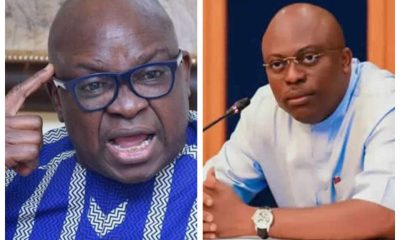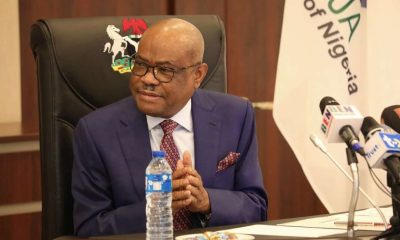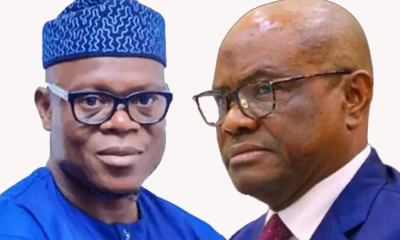Headlines
Rivers emergency rule: Supreme Court reserves judgment in PDP governors’ suit

The Supreme Court has reserved judgment in the suit challenging the declaration of a state of emergency in Rivers State and suspension of Governor Siminalayi Fubara by the president.
A seven-member panel of justices, led by Inyang Okoro, reserved judgment after the parties in the suit adopted their processes on Tuesday.
The suit marked SC/CV/329/2025 was initiated by PDP governors from Adamawa, Enugu, Osun, Oyo, Bauchi, Akwa Ibom, Plateau, Delta, Taraba, Zamfara, and Bayelsa.
The defendants in the suit are the federal government and the national assembly.
The legal action follows President Bola Tinubu’s declaration of a state of emergency in Rivers state on March 18, citing the ongoing political crisis and the vandalisation of oil installations.
The president suspended Fubara; his deputyNgozi Odu, and all house of assembly members for six months.
Tinubu also appointed Ibok-Ete Ibas, a retired vice-admiral, as the sole administrator for Rivers.
The senate and the house of representatives approved Tinubu’s request for the emergency rule.
The suit questions the legality of Tinubu’s actions, particularly whether the president can lawfully suspend or interfere with the offices of a governor and deputy governor, replacing them with a sole administrator.
The governors are also challenging the suspension of the Rivers state house of assembly and the constitutionality of the appointment of a sole administrator.
The plaintiffs argued that the actions taken by the president are in violation of several provisions of the 1999 constitution, particularly regarding the powers and functions of state governors and assemblies.
During Tuesday’s proceedings, the fifth plaintiff, Delta state, withdrew from the suit, which was not opposed by Lateef Fagbemi, attorney-general of the federation (AGF) and counsel to the federal government.
Adopting his written address, Eyitayo Jegede, counsel to the plaintiffs, clarified that the suit was not intended to dispute the president’s constitutional power to declare a state of emergency.
Rather, he said, the case seeks to determine the extent to which such a proclamation can affect the offices of a governor, deputy governor, and members of a state house of assembly.
The AGF, in his address, argued that Rivers state was in deep political crisis involving the governor and the executive arm, which necessitated the president’s intervention in March.
He submitted that Fubara, his deputy, and members of the state assembly were not removed from office but “merely suspended”, adding that it was an extraordinary measure necessary to restore order in the state.
“No responsible government would sit back and allow the state to burn without taking any action,” Fagbemi said.
“My lords, the president had to act and act fast to safeguard the state. The starting point is the judgment of the supreme court, wherein your lordships held that as things were at that time, there was no government and governance in Rivers State.
“Therefore, the president had no choice but a duty to act in the best interest of the state.
“What he did was to suspend the protagonists, not remove them. Rivers was in an extraordinary situation, and that required taking extraordinary measures to restore peace and protect democracy.”
Counsel to the National Assembly, Charles Yohila, aligned himself with the AGF’s position and also prayed the court to dismiss the case.
After hearing all the parties, the apex court reserved judgment to a date that would be communicated to the parties.













